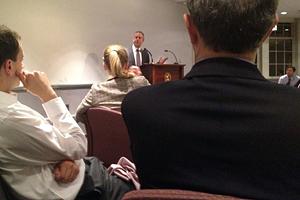May 3, 2012
by Adam Gerchick ’13
“Speech doesn’t corrupt. Money corrupts. Money isn’t speech.” So argued former U.S. Sen. Russ Feingold during his keynote address at an Amherst political science conference on April 20.
Feingold, a Wisconsin Democrat, spoke to about 100 Amherst faculty members, students, alumni and guests as part of the college’s Colloquium on the Constitution and the Imagining of America, a twice-yearly conference organized by Amherst’s Department of Law, Jurisprudence and Social Thought (LJST). Each conference explores a different aspect of the character of the U.S. Constitution and its relevance to modern legal, political and social debates.
 Former U.S. Sen. Russ Feingold addresses
the audience at the Colloquium on the Constitution and the Imagining of America on April 20. |
The senator’s message fit neatly within the focus of the colloquium’s spring conference, which explored corporate influence on American politics. Feingold, who with Sen. John McCain cochampioned the McCain-Feingold campaign finance reform act of 2002, argued that unchecked campaign spending by corporations and other special interests corrupts candidates and undermines democracy. He said that large corporate contributions in support of political candidates, including when given to partisan groups officially unaffiliated with the campaigns themselves, are “transactional situations,” given with the hope that successful candidates will feel beholden to those donors and vote in favor of their interests.
Speaking at Valentine’s Lewis-Sebring Dining Room during a colloquium dinner, Feingold excoriated the Supreme Court for striking down much of the past century’s campaign-finance law in the 2010 Citizens United case. In ruling that private spending on political activity, with certain exceptions, constitutes free speech protected by the First Amendment, the court struck down most limitations on political spending and contributions.
“It was essentially a lawless decision,” argued Feingold. His assessment of the decision, together with others by the current justices, was unequivocal: “The court is in danger of losing its legitimacy.”
The colloquium—which was organized by Austin Sarat, the William Nelson Cromwell Professor of Jurisprudence and Political Science and chair of political science—came on the heels of the semiannual Colloquium on the American Founding, held one week prior by fellow faculty member Hadley Arkes, the Edward N. Ney Professor of Jurisprudence and American Institutions. Sarat’s conference provides something of a liberal alternative to Arkes’s historically more conservative gathering; that event explores the philosophies of the Founding Fathers and Abraham Lincoln regarding the concept of natural law.
At the colloquium, Feingold accused both major parties of allowing contributions to corrupt them. In particular, Feingold cited the deregulatory Telecommunications Act of 1996 and the normalization of trade relations with China as two laws for which campaign donors essentially ensured their passage.
He even went so far as to argue that corporations risk becoming partisan entities, with consumers having to consider whether their purchases advance policies they oppose. Feingold suggested the Citizens United decision could give rise to “Democratic and Republican toothpaste,” with consumers picking their preferred brands based on the politics of their respective manufacturers.
Despite his dire assessment of the current state of American campaign-finance law, Feingold expressed hope either that the Supreme Court would reverse itself—it recently accepted a case from Montana that would give it such an opportunity—or that the collective impact of small donors could mitigate the new power of special interests. After all, Feingold argued, it was the strength of individual donations in 2008 that motivated corporations to strengthen their political efforts. Said Feingold, “The corporate powers saw the face of this democracy and it terrified them.”
Several dozen students were invited to attend the dinner and a preceding cocktail party at which the students chatted with professors over drinks—soft ones for the under-21 set. After the speech, a few students took the initiative to meet Feingold individually, lining up to introduce themselves. The senator engaged them, asking their thoughts on his remarks. And he didn’t even follow up by soliciting a contribution.